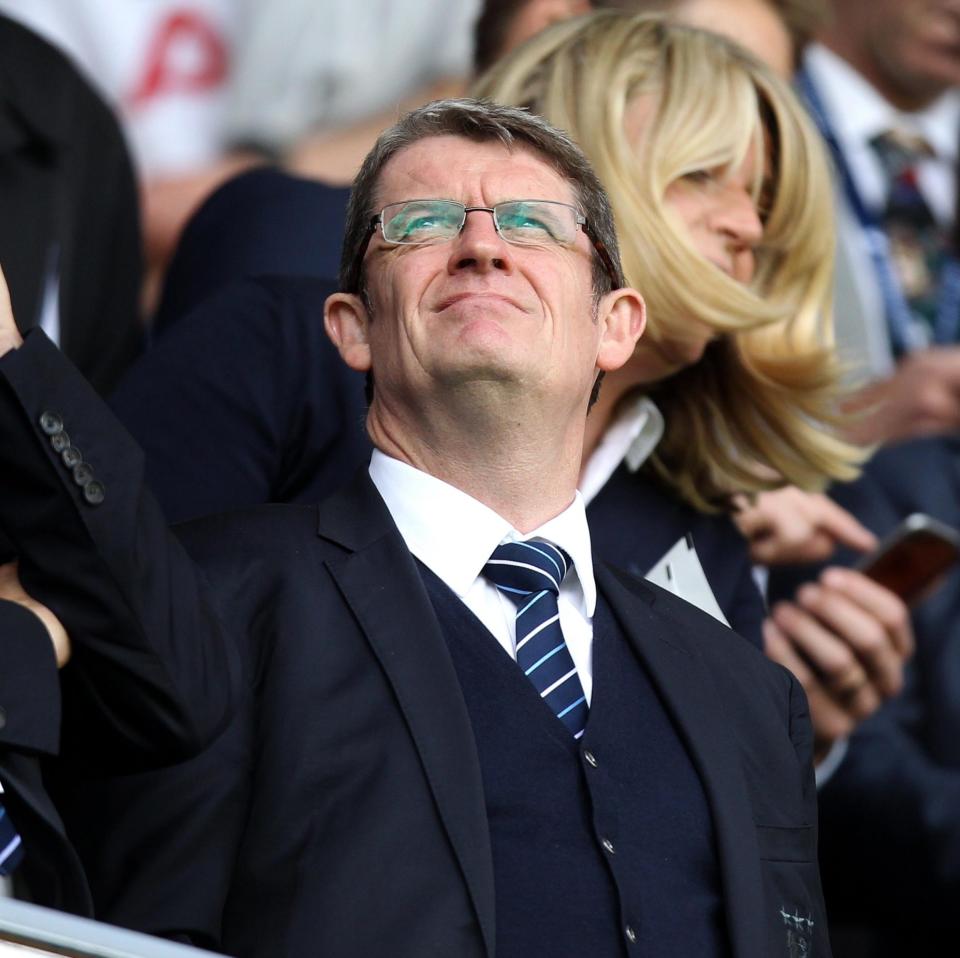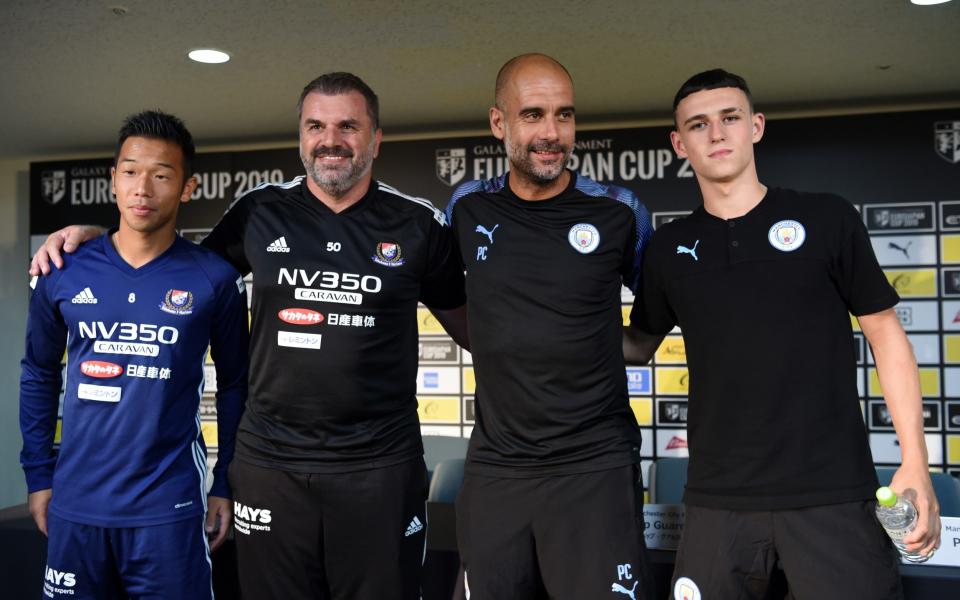Why Ange Postecoglou has Manchester City to thank for his success

The story begins with Vince Grella, once of Blackburn Rovers as well as an Australia international, recommending Ange Postecoglou to Frank Trimboli, one of Europe’s biggest football agents – and from there a management career began to take wing.
Back in 2015, the current Tottenham Hotspur manager had only once coached outside of Europe, a brief stint back in Greece in 2008, the country his family had left for Australia decades earlier. As the manager of the Australia national team, he had won the AFC Asian Cup, the biggest triumph in the Socceroos’ history, but his ambition of making it in Europe was no closer to realisation. He simply did not feature on the lists of coaches European clubs considered when making appointments, but that was about to change.
It came about through an introduction to the former Arsenal and Sheffield Wednesday winger Brian Marwood, who would champion Postecoglou. Marwood was some ally – the global head of football at City Football Group (CFG), the now 12-club global enterprise, which has its mothership in Manchester City – the all-conquering team Postecoglou’s Tottenham face on Sunday.
“I will be forever indebted to Brian Marwood,” Postecoglou said on Friday, speaking at the club’s Hotspur Way headquarters. “He was the first to notice me out in Oz. We started a relationship back then in terms of him following my career and he was the one who pointed me towards Yokohama when I was in Australia.”

Back in 2015, that first meeting was still a few stages away. Grella, who played much of his club football in Serie A and Serie B, was pushing Trimboli, a fellow Italian-heritage Australian, to consider representing Postecoglou.
Trimboli spent two months off and on with Postecoglou in 2016 when the then Socceroos manager was in Europe catching up with his players. Not easily impressed, Trimboli became convinced that his compatriot had what it took to make a breakthrough for the Australian coaches in Europe. Trimboli had done the same himself as an agent despite similar scepticism in his early days. The question then was where Postecoglou’s breakthrough might come.
Trimboli identified CFG as an obvious bridge for Postecoglou to prove himself to European executives who were not prepared yet to give him a European job. Something of a managerial kingmaker, Marwood had worked as a Nike executive after his own playing career ended and then joined CFG in the early days of the Abu Dhabi takeover. Marwood visited Australia occasionally to check on the CFG club Melbourne City, and he knew something of Postecoglou’s success with Brisbane Roar. Trimboli made the introduction.
Marwood offered Postecoglou the job managing the Japanese club Yokohama F Marinos in 2017. Trimboli’s fellow head of football at the Base Soccer agency, Leon Angel, has been the long-term advisor for Arsene Wenger since the Frenchman’s arrival in England in 1996. Angel and Trimboli reasoned that if the J-League had been good for Wenger’s career beyond his native France, it might just do the same for Postecoglou.
The only issue was that Postecoglou had just qualified for the 2018 World Cup finals with the Socceroos. Nevertheless, his relationship with Football Australia was strained. He could not see a clear vision for the game in Australia. In December of that year he gave up the World Cup to move to Japan.
Postecoglou inherited a team in trouble and a squad that had misgivings about the direction he wanted to take them. Unlike other clubs, CFG owned only 20 per cent of the Marinos, with the rest in the control of Nissan, and Marwood had to persuade rather than insist on Postecoglou’s appointment. In his first season the club only just avoided relegation. In the second, in 2019, he won the J-League. The CFG machine had struck the jackpot again.
The key moment in Postecoglou’s relationship with CFG is often identified as the Marinos’ friendly against Manchester City in 2019 – pre-season for the Premier League club, and mid-season for the J-Leaguers. Postecoglou’s players famously had more possession than Pep Guardiola’s side – a 58 per cent share – as well as 607 passes to City’s 455. The joke was that Guardiola’s team – in the tradition of most unfancied reversals against them – held on for a 3-1 win. Afterwards, Guardiola would rhapsodise about the Marinos’ performance.

But for Postecoglou, the big moment had come when Marwood took a chance on him. His career had already taken off in Japan by the time City played there and the connection with the then CFG head of recruitment Mark Lawwell, now at Celtic, could not have hurt. Mark Lawwell is the son of Peter, Celtic’s long-serving and influential chief executive, now back at the club as chairman. Postecoglou would take over Celtic in June 2021.
Postecoglou said the CFG appointment at Marinos had at last given him a way into the elite European game. He had been able to visit Manchester and meet Guardiola and his then assistant Mikel Arteta. Most of all, he said it gave him access to the secret kingdom of CFG’s global database on players.
“I could log into their database and they literally had every footballer in the world tracked,” Postecoglou said. “It’s fair to say I wasn’t competing for the same players as them [City]. Our budget was a bit different. But just being able to access the information they had at the time and being able to say, ‘This is what I need’. Talking to the people behind the scenes who were brilliant. It particularly allowed me to make decisions around foreign players … the world has changed now and most football clubs do their recruiting in a similar way. But for me back then it was great exposure.”

As for that game against City in 2019, the philosophy was the same as it is likely to be on Sunday. Postecoglou does not want his team to take a backward step just because of the reputation of the opposition. “We could have gone into that [2019] game,” Postecoglou recalled on Friday, “and said, ‘Let’s see how we can try to beat Manchester City’. Or we can go in and say, ‘Let’s just play our football and see where that takes us’. That’s what we did. I said to the boys, ‘Let’s go. Keep the ball. Press them. Be aggressive … and you know what? If we get smacked 6-0, we get smacked 6-0, but we’ve measured ourselves’”.
The Marinos’ performance, he said, was vindication in what became a major season. Postecoglou got some recognition himself, although it would be another four years before the two managers meet again. “In the aftermath, some nice things were said,” Postecoglou said, “but then the next day people moved on and the circus left town and I was left in Yokohama.”

 Yahoo Sport
Yahoo Sport 



































































